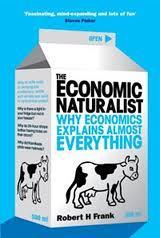The theme of Rebecca Costa’s 2010 book The Watchman’s Rattle* is that the complexity of modern life is itself the key to the complex problems we face.  Our brains did evolve to handle complexity, especially that of social relations. But the resulting cultural evolution outruns our brains’ biological evolution, and thus our cognitive abilities.
Our brains did evolve to handle complexity, especially that of social relations. But the resulting cultural evolution outruns our brains’ biological evolution, and thus our cognitive abilities.
Early on, Costa discusses the Mayans, who she believes succumbed mainly to drought. Their end game degenerated into religious mysticism. Why, Costa asks, didn’t they instead continue pursuing rational solutions? – more wells, reservoirs, cisterns, etc.? In fact, she had earlier called the Mayan hydraulic systems “masterpieces of design and engineering.” But she thinks they hit what she labels a “cognitive threshold.” Actually, however, it seems that rational solutions reached their limit – there was nothing the Mayans could have done to overcome their water deficit.

To explain, she invokes the concept of the meme (coined by scientist Richard Dawkins), the cultural equivalent of genes. Memes are ideas that propagate, and can pre-empt other forms of thought. Like religion, a powerful set of memes that certainly obstruct other, incompatible kinds of thinking.
Costa uses the term “supermeme,” and focuses on several. One she calls “irrational opposition.” While I think this misapplies the meme concept, Costa is certainly on to something: a culturally rooted thinking pattern of “rejecting, criticizing, suppressing, ignoring, misrepresenting, [and] marginalizing rational solutions.”

Climate change is a problem where a “cognitive threshold” does seem to be a stumbling block. Interestingly, it’s the environmentalists Costa faults here, for turning their beliefs into a kind of religion rather than a fact-based program for rational action. She’s talking about their insistence solely upon reducing carbon emissions. This does have earmarks of religious belief, both in its moralistic manichaeanism – casting humanity as a pack of sinners who need to don hair shirts in penance – and its disregard for factual reality. Indeed, it’s not just the climate denialists with their heads in the sand – the believers are wedded to a plan that cannot possibly work. Even if carbon emissions went to zero, global temperatures would still continue to rise significantly.
Costa instead advocates geo-engineering solutions – for example, replicating the effect of volcanoes by putting sulfate particles in the upper atmosphere to cool the planet – a vastly more efficacious and vastly less costly approach (as I’ve discussed). Yet all such proposals the McKibbenite climate zealots demonize as heresy.
Costa also applies her analysis to politics, where again inciting opposition is far easier than enlisting support for anything positive. That explains negative campaigning. All you need do is give voters one reason to reject an opponent. Thus we get Willie Horton and foofaws over “legitimate rape.” And while everyone says politicians should compromise, the actual elements of any policy compromise typically engender far more vehement opposition than support.
Though much of the book is great, unfortunately some is utter nonsense. While Costa pokes fun at the old wives’ tale about not swimming for an hour after eating, she falls for the equally false myth of needing eight glasses of water daily.
Worse, Costa doesn’t much hold with personal responsibility. One person’s obesity might be his own fault; but the obesity of millions rises to being systemic. She mocks personal efforts like recycling trash, explaining what little difference it actually makes (household trash being a small fraction of our industrial total). The problems at issue are societal, true enough. But who is society but us? On Costa’s logic, voting too is pointless because one vote can’t make any difference; but obviously, collectively it can be momentous. There is no sense in talking about what “society” can or must do, divorced from what its individual constituent members do.

Anyway, after going through a litany of those problems, and all our mental obstacles for tackling them, Costa finally comes down with a single catch-all answer: insight.

If I sound sarcastic, it’s only partly true. Costa argues that we can improve brain function through mental exercise, and there’s much supporting evidence. Indeed, it appears that fairly modest bouts of brain exercise can have long-lasting cognitive benefits. Why don’t our schools include this? I’ve written (“The Marshmallow Test”) about how inculcating some kinds of character discipline can have big effects, improving kids’ ability to thrive in school and life; and without this, conventional “3Rs” teaching may be largely futile for many students. The same applies to mental exercise to sharpen cognitive functioning. Oddly, Costa doesn’t say this, but our society’s failure to utilize these beneficial techniques is a perfect example of the problem, and changing this could be an important part of the solution.
Meantime, in fact, humans have been thinking smarter and better. This, as I’ve noted, is a key reason Pinker fingered for declining violence in his book, The Better Angels of Our Nature. And, yes, it is declining (read the damn book). Of course we haven’t attained perfection but we’re getting there. And while Costa stresses that our lives’ complexity is outrunning our brain evolution, that only applies to our individual brains. But our mental power is collective. No single person today completely understands any advanced technology, but we don’t need that, when we can combine and coordinate the understandings of the many.

* This title is intended to evoke old-time watchmen who used rattles to signal danger.
